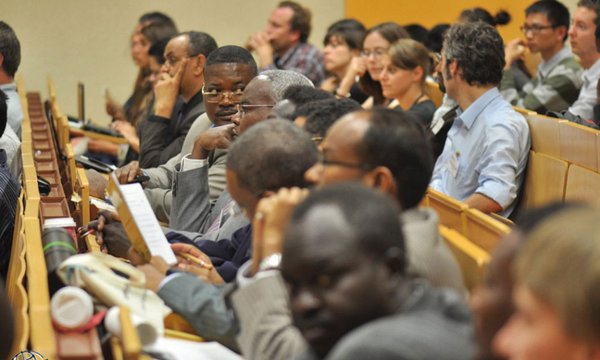- Share this article
- Subscribe to our newsletter
Tropentag 2011 conference in Bonn
The problem is as old as it is burning and yet it is unsolved: Increasing population, globalisation effects and a weak resource base in most developing countries require an ever more efficient supply of agricultural food and non-food commodities. Growing production and productivity must be reconciled with growing concerns for the environment. The rapid pace of global change processes makes it increasingly difficult to adapt particularly those production systems operating in variable, high-risk environments.
”Development on the margin” was the lead topic of the Tropentag 2011, held from October 5–7 2011 at the University of Bonn, Germany, under the auspices of the Federal Minister for Economic Cooperation and Development, Dirk Niebel. Organised by Mathias Becker, Professor for Plant Nutrition in the Tropics and Subtropics and his team from the Institute of Crop Science and Resource Conservation INRES at the University of Bonn, the Tropentag initially received over 1,200 scientific contributions, and finally saw 734 participants from 56 countries presenting and discussing their scientific work in 128 talks and 373 posters. All tackled the following lead questions: What is the future role of the marginal environments with fragile balances in natural and cultural ecosystems? How to balance development in favourable and marginal environments? How can or should peoples and communities that are currently marginalized become key players in an increasingly globalised resource use? To which extent can these groups shape development in their own circle of influences?
The core of marginality
Setting the scene were keynote addresses by Sir Gordon Conway (Imperial College London, UK), Rattan Lal (Ohio State University, USA) and Paul Richards (Wageningen University, The Netherlands). These underlined that marginality is a societal relational concept rather than an inherent property of any given environment, ecosystem or community of people. It is the way that societies attribute value to some commodities and services rather than others that determines what is regarded marginal. It is the way that land users manage and exploit their soils – voluntarily with a choice of options or for want of alternatives – that determines whole regions to become marginalised in the long run. And finally, it is the way in which societal groups interact and use and enforce power relations that lead to societal groups being regarded as marginal.
Trivial as this may sound it appears often inadequately considered, particularly when identifying societal problems that development-oriented agricultural research strives to solve. Viewing marginality as a societal concept permits a much wider range of ”thinkable” development pathways for which agricultural research could provide the knowledge base and the theoretical concepts. And, encouragingly, this wider range becomes increasingly reflected in the wide variety of scientific approaches and concepts presented at the Tropentag.
Outlook
Having nearly doubled in size over the past five years, the Tropentag is the annual development-oriented, inter- and trans-disciplinary scientific discussion forum for students, scientists, extension workers, development strategists, decision makers, politicians and practical farmers – indeed all who are interested and engaged in agricultural research and rural development in the tropics and subtropics. ATSAF e.V., the Council for Tropical and Subtropical Research (www.atsaf.de) has made it its priority to spearhead the joint organising committee, increase the diversity and quality of the conference and to involve more players at the European level. Having shed light on “the margin” in 2011, Tropentag will discuss resilience of agricultural systems as the lead topic in 2012, when it will be hosted jointly by the Universities of Kassel(Witzenhausen) and Göttingen.
Christian Hülsebusch, Folkard Asch
ATSAF e.V., Witzenhausen, Germany





Add a comment
Be the First to Comment